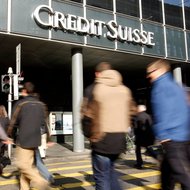Shares on Wall Street were mostly flat in afternoon trading on Friday, putting indexes on track to post another strong week after repeatedly reaching new highs.
The length of the recent rally has surprised many, and the upward momentum may be difficult to sustain without further trading catalysts like first-quarter earnings reports, which are nearing an end. The Standard Poor’s 500-stock index ended a five-day streak of record closing highs on Thursday, while the Dow Industrial average broke a two-day streak by dipping modestly.
Still, investors expect shares to generally trend higher, given the Federal Reserve’s accommodative monetary environment and encouraging data on the labor market, including jobless claims on Thursday and last week’s payroll report.
“Between the jobs report, quantitative easing and a zero percent interest rate policy,” said Chris Bertelsen, chief investment officer of Global Financial Private Capital in Sarasota, Fla., “there’s no question that there’s a floor under the market and that it wants to go up, even if some sectors are overdone.”
Shares fluctuated on Friday, and by early afternoon, the S.P. 500 was 0.2 percentflat, while the Dow Jones industrial average was down about 0.2 percent and the Nasdaq was up 0.3 percent. All three of the indexes have gained this week.
“We’re seeing a real rotation out of defensive names and into groups like technology and industrials,” said Mr. Bertelsen, who helps oversee $2 billion in assets. “That’s keeping the market moving and preventing it from plateauing.”
Priceline.com reported first-quarter earnings late Thursday that beat expectations, though its second-quarter outlook disappointed. Shares moved 3.5 percent higher on Friday.
Gap, the clothing retailer, rose 5 percent after reporting strong results.
With 89 percent of the S.P. 500 having reported, 66.7 percent have beat profit expectations, above the average since 1994 of 63 percent. However, only 46.4 percent of companies have beaten revenue expectations, well under the average since 2002 of 62 percent.
Carl Icahn, the activist investor, and Southeastern Asset Management proposed an alternative to a $24.4 billion buyout deal for Dell that involved giving shareholders an option to receive either $12 a share in cash or $12 in additional shares valued at $1.65 each. Shares of Dell rose 0.5 percent on Friday.
Article source: http://www.nytimes.com/2013/05/11/business/daily-stock-market-activity.html?partner=rss&emc=rss

